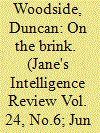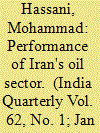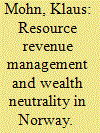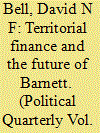| Srl | Item |
| 1 |
ID:
166564


|
|
|
|
|
| Summary/Abstract |
Since the middle of the last century, the world has seen the emergence of Sovereign Wealth Funds (SWF). According to the Sovereign Wealth Funds Institute (2012), these legal entities can be defined as “a state-owned investment fund or entity that is commonly established from balance of payments surpluses, official foreign currency operations, the proceeds of privatizations, governmental transfer payments, fiscal surpluses, and/or receipts resulting from resource exports.” The SWFs are governed by the Santiago Principles, a document constructed by the IMF's International Working Group of Sovereign Wealth Funds (IWG) to recommend and to standardize the applications and investments of this kind of fund. SWFs are created in order to meet macroeconomic demands, using a series of investments strategies, which including foreign assets acquisitions. For instance, the Norwegian Government Pension Fund is one of the world's model SWFs. Its revenue is obtained from petroleum exploitation and is considered a savings fund, although part of the financial return can be applied in budget deficit. Following this example, Brazil created the Pre-Salt Social Fund to invest pre-salt petroleum revenues, and consists of a savings fund, according to the IMF classification. The present article focuses on the analysis and comparison of the legal structures of the Norwegian Government Pension Fund (GPF) and the Brazilian Pre-Salt Social Fund (SF), aiming to understand if the Brazilian fund applies the Norwegian standards.
|
|
|
|
|
|
|
|
|
|
|
|
|
|
|
|
| 2 |
ID:
115413


|
|
|
| 3 |
ID:
115174


|
|
|
|
|
| Publication |
2012.
|
| Summary/Abstract |
This paper disentangles the interactions between oil production profiles, the dynamics of oil prices and growth trends. We do so through a general equilibrium model in which Peak Oil endogenously emerges from the interplay between the geological, technical, macroeconomic and geopolitical determinants of supply and demand under non-perfect expectations. We analyze the macroeconomic effects of oil production profiles and demonstrate that Peak Oil dates that differ only slightly may lead to very different time profiles of oil prices, exportation flows and economic activity. We investigate Middle-East's trade-off between different pricing trajectories in function of two alternative objectives (maximisation of oil revenues or households' welfare) and assess its impact on OECD growth trajectories. A sensitivity analysis highlights the respective roles of the amount of resources, inertia on the deployment of non conventional oil and short-term oil price dynamics on Peak Oil dates and long-term oil prices. It also examines the effects of these assumptions on OECD growth and Middle-East strategic tradeoffs.
|
|
|
|
|
|
|
|
|
|
|
|
|
|
|
|
| 4 |
ID:
073738


|
|
|
| 5 |
ID:
150009


|
|
|
|
|
| Summary/Abstract |
An important idea behind the Norwegian oil fund mechanism and the fiscal spending rule is to protect the non-oil economy from the adverse effects of excessive spending of resource revenues over the Government budget. A critical assumption in this respect is that public sector saving is not being offset by private sector dis-saving, which is at stake with the hypothesis of Ricardian equivalence. Based on a framework of co-integrating saving rates, this model provides an empirical test of the Ricardian equivalence hypothesis on Norwegian time series data. Although the model rejects the strong-form presence of Ricardian equivalence, results indicate that the Norwegian approach does not fully succeed in separating spending of resource revenues from the accrual of the same revenues.
|
|
|
|
|
|
|
|
|
|
|
|
|
|
|
|
| 6 |
ID:
138877


|
|
|
|
|
| Summary/Abstract |
This article traces the changing funding relationships between Scotland and the UK government. Beginning from the Barnett Formula, it examines how the changing support within Scotland for greater political autonomy from Westminster has influenced the mechanisms that have determined Scotland's fiscal structure. Increasing support for the SNP, and then for the Yes campaign in the September 2014 independence referendum, has led to a mixture of new powers being granted to the Scottish Parliament. The Scotland Act 2012 extends the Scottish government's control over income tax and some other small taxes. Although independence was rejected by the Scottish people in September 2014, the ‘Vow’ made by the Westminster parties immediately before the vote is leading to far-reaching changes in the UK's fiscal structure. This will cause a very substantial change in intergovernmental relations within the UK, which the Barnett Formula may not survive.
|
|
|
|
|
|
|
|
|
|
|
|
|
|
|
|